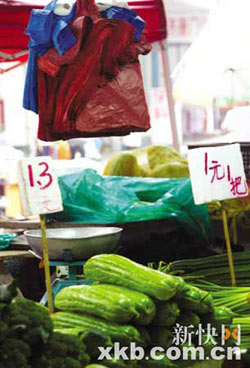Illegal producers
"We shut down our two factories because more than 90 percent of the products were restricted," said Wang Hongbing, formerly Huaqiang's general manager, who is now head of a new plastics company called Huiqiang. It makes the legal, thicker plastic bags.
 |
|
File photo: Vendors usually offer ultra-thin plastic bags, supplied by thousands of illegal workshops, to customers because they are cheap, costing less than half of one US cent. Legal, thicker bags cost around three US cents depending on size.
|
"We are struggling," Wang said. Squeezed by illegal factories and higher production costs, Huiqiang is running at its half capacity, making about 30,000 tons of plastic bags a year. That's a tenth of Huaqiang's annual output before closure.
Wang wants the government to level the field for manufacturers with production licenses.
"The plastic bag ban has a strong legal affect on us. But more than 90 percent of small manufacturers and workshops turn a blind eye to it. Related governmental departments should crack down on these illegal producers," he said.
The nationwide ban, including a check of underground workshops, was enforced and supervised by the National Development and Reform Commission (NDRC) and the State Administration for Industry and Commerce (SAIC).
Dong Jinshi, environmentalist and vice-director of the Packing Resources Utilization Commission of the China Packing Assn, says authorities should take responsibility for being unable to check production and sales of banned plastic bags. Vendors were also to blame because they won't stop handing out bags for fear of losing customers.
Xie Zhenhua, NDRC deputy director, last week admitted problems with illegal manufacturers and lack of enforcement in rural areas.
The SAIC agreed and said it began handing out more fines for violators in March. Since then, it checked some 250,000 retailers and more than 2.3 million small businesses across the country. The SAIC confiscated about 260 million illegal plastic bags and 1,250 manufacturers and dealers without licenses were punished.
On the eve of the first anniversary of the ban, Xie said the NDRC and the SAIC was preparing to jointly launch a one-month special national inspection campaign to solve problems and improve implementation of the regulation.
Still, local officials admit the difficulties of wiping out illegal workshops, which often are hidden in the countryside or suburban areas.
Xu Junyan, head of the NDRC's branch in Suiping, where Huiqiang was based, says the county authority had turned off power to illegal factories and even destroyed their equipment.
"They are very mobile and move their machines around to various places, so they are often difficult to catch," Xu said.
Miao Aichen, an official with the Henan Administration for Industry and Commerce, said authorities had made major achievements in urban areas but still had work to do in China's countryside as consumers there have not been receptive to change.
"The plastic bag ban aims to change the long-developed habit among people, therefore it has a long way to go," he added.
(
Shanghai Daily June 8, 2009)